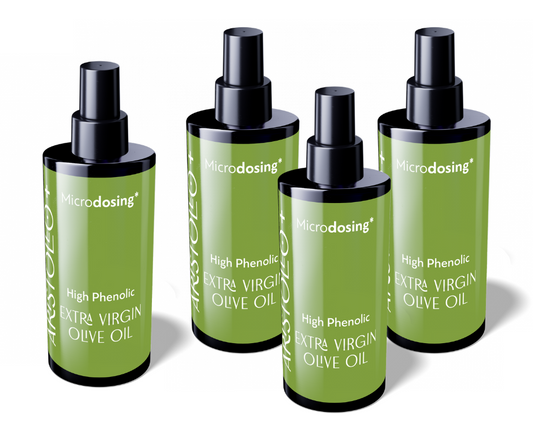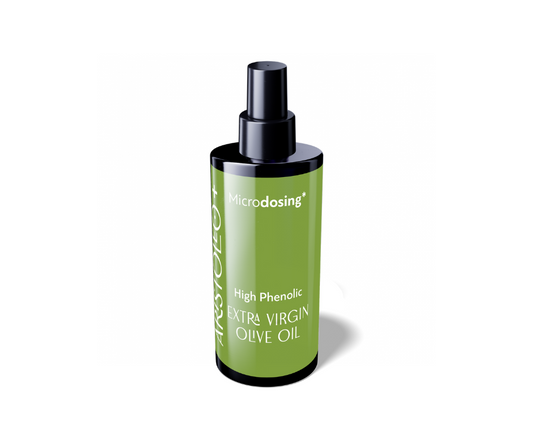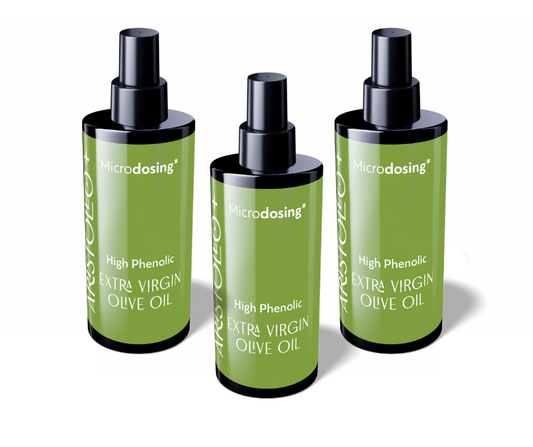
The Science Behind High Phenolic Olive Oil
How EU Research Changed Everything
For over 5,000 years, olive oil has been credited with hundreds of health benefits: pain relief, antibacterial properties, blood pressure reduction, blood sugar management, heart strengthening, cancer prevention, performance enhancement, Alzheimer's prevention, skin disease treatment, and digestive health support.
While these historical health claims were based on anecdotal evidence, one groundbreaking development in 2012 changed the olive oil industry forever.
The Game-Changing EU Health Claim
The EU 436/2012 labeling health claim was accepted and ratified by the EU Commission after 10 years of research and multiple clinical trials across 7 different EU countries. The claim simply states that "olive oil polyphenols may contribute to the reduction of oxidative stress of blood lipids."
However, the most significant aspect of this health claim is what it reveals: the enhanced health benefits of olive oil come from polyphenols (or more accurately, bio-phenols or phenolic compounds) - not from the olive oil itself.
These bio-phenols are responsible for lowering “bad” cholesterol (LDL) oxidation, and Dr. Maria-Isabel Covas of Barcelona University and her research team found this effect to be dose-dependent. Additionally, these compounds raise levels of "good" cholesterol, which is vital for both brain and heart health.[1]
The health benefits of olive oil are 99 percent related to the presence of the phenolic compounds, not the oil itself. Nasir Malik, research plant physiologist, U.S.D.A.
The EU established that olive oil must contain at least 250 mg of "polyphenols" per kg to qualify for the health claim label. Today, High Phenolic Extra Virgin Olive Oils (HP-EVOOs) are being produced with concentrations well above 1,000 mg and sometimes, > 2000 mg per kg, though they cost significantly more than regular EVOO due to requiring substantially more olives per liter and less olive oil to ingest for the same effect.
Dr. Magiatis: The Pioneer Behind the Science
That same year, Dr. Prokopios Magiatis and his research team developed a revolutionary method for measuring bio-phenol concentrations in olive oil using qNMR (quantitative Nuclear Magnetic Resonance).[2] They decided to investigate the enhanced health benefits of higher bio-phenol doses - and what they discovered transformed our understanding of olive oil.
Their findings exposed how the industrialized olive oil sector had been misleading consumers by attributing the health benefits to olive oil being simply a monounsaturated fat. Since monounsaturated fat content is nearly identical between plain olive oil and extra virgin olive oil, this allowed the industry to flood markets with lower-quality oils that were chemically processed to remove bad odors while retaining only mild taste or no taste at all.
The Reality of Today's Olive Oil Market
Extra virgin olive oil (EVOO) represents less than 10% of global market share. Plain olive oil was created to compete with corn, sunflower, and canola oils. This processed oil is typically produced from overripe olive fruit damaged by fruit flies and insects, resulting in high acidity levels that make it inedible in its natural state. The industry then chemically processes these oils to remove odors and bad tastes, adding small amounts of extra virgin olive oil for minimal flavor and the label notation of “extra virgin olive oil”.
Ancient Wisdom Meets Modern Science
Dr. Magiatis and his team analyzed thousands of extra virgin olive oil samples from Greece, Cyprus, Italy, Croatia, Slovenia, Spain, and the USA. Their results confirmed what ancient physicians like Hippocrates and Dioscorides had long insisted: true "medicinal" olive oil can only be produced from unripened green olives.
As olive fruit matures, bio-phenols become oxidized or altered, resulting in oils stripped of their enhanced health benefits - essentially containing little to no beneficial bio-phenols. The active bio-phenols like oleocanthal and oleacein are only released during the malaxation process – thus the term “derivatives” of hydroxytyrosol and tyrosol as stated in the health claim. This lack of clarity has led to massive misinformation.
The Promise of High Phenolic EVOO
Multiple clinical studies conducted in laboratories and with healthy volunteers have paved the way for increased High Phenolic (HP) EVOO production. Initial studies show promising results for people in early stages of Alzheimer's and leukemia, as well as effects on cancer progression and heart health.
The EU 432/2012 labeling health claim has become a catalyst for small independent olive oil growers, who can now demonstrate measurable results to consumers. Initial clinical studies indicate that the health benefits of olive oil phenolic compounds are more far-ranging than previously imagined.
The Challenge of Further Research
The University of Athens research team is primarily responsible for HP EVOO's rising popularity. However, all evidence to date is considered preliminary because comprehensive multi-center, large-scale, triple-blind clinical trials have not yet been conducted.
Since no patent exists for this new HP EVOO category, the millions of dollars required for definitive health claim research are not readily available. The industrialized olive oil business actively opposes these health claims because they bring unwanted transparency to the industry.
This has left small independent olive growers to champion early harvest HP-EVOO with elevated phenolic concentrations, creating a new market segment based on measurable health benefits rather than marketing claims.
More and more health conscious individuals are seeking this caliber of olive oil for its potential preventive or therapeutic qualities as well as fitness attributes. Since olive oil is a food, there are no contraindications for people to try it for themselves and experience its various benefits.
Each person is different and illness a complexity of circumstances. HP EVOO is best used as part of a responsibly balanced lifestyle of good nutrition, adequate rest and physical movement.
NOTE: Natural medicinal compounds can be potent. If someone is on medication or under doctor’s care, it is necessary to disclose the addition of HP EVOO to your health regimen. Some research indicates that it can enhance the efficacy of pharmaceuticals, which in turn can be adjusted in strength or duration of protocol – under doctors’ care, of course.
If you’d like to explore how High Phenolic EVOO can support your daily wellness, you can learn more here → Precision Wellness
Featured collection
-
Aristoleo+ MicroDosing Starter
Regular price $28.99 USDRegular priceUnit price / per -
Daily Protocol Trio — 3 x 50 ml
Regular price $78.00 USDRegular priceUnit price / per$86.97 USDSale price $78.00 USDSale -
 Sale
SaleWellness Reserve
Regular price $104.00 USDRegular priceUnit price / per$115.96 USDSale price $104.00 USDSale



